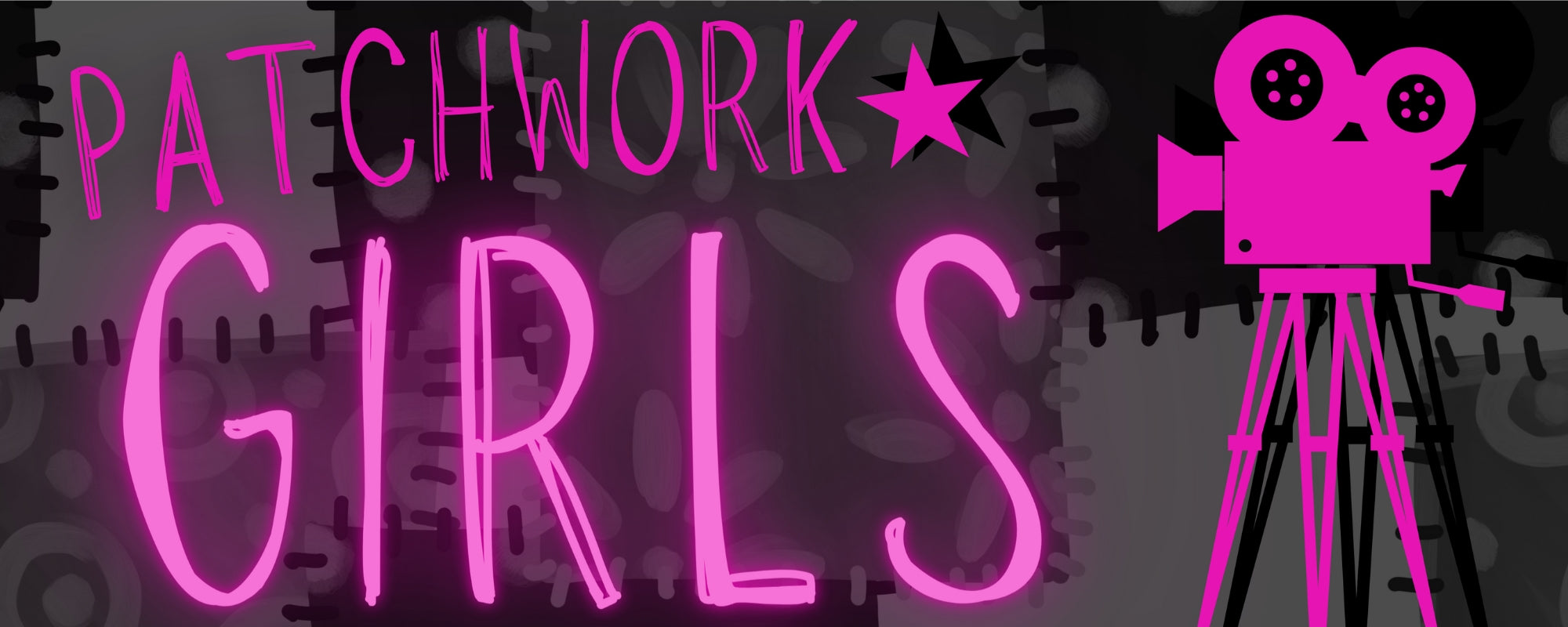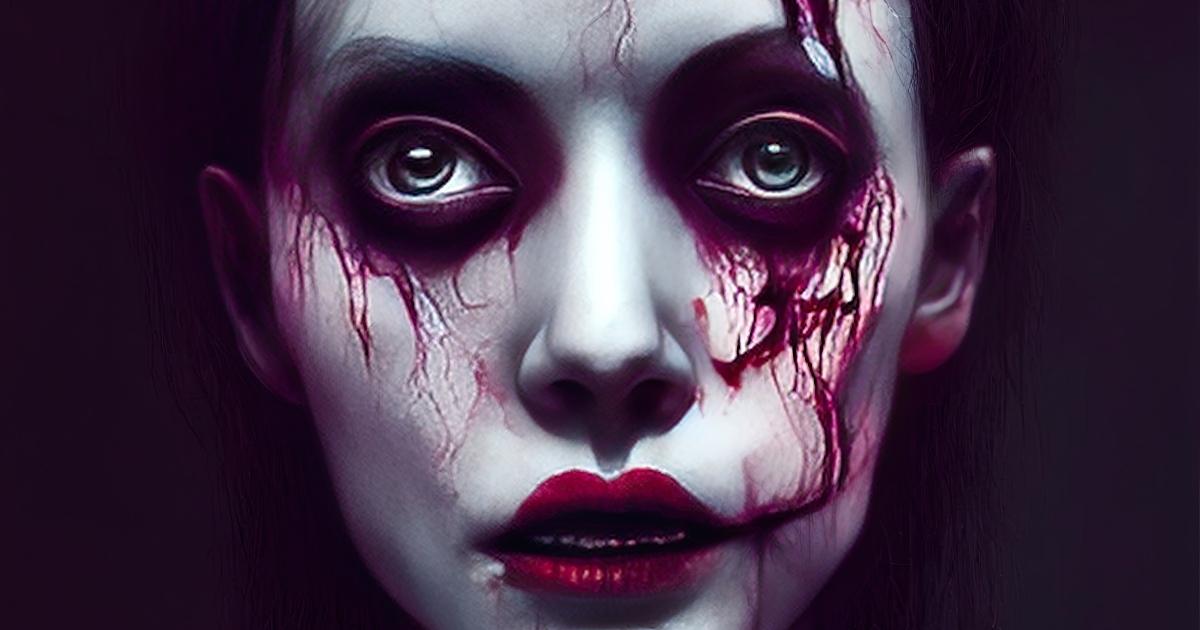

Patchwork Girls
She’s died more times than she can remember. Been put back together more times than she can count. A patchwork girl, made up of replaceable parts. Her ability to die but not die should make her stronger, feel like a superhero, but instead, she remains fragile and weak, her whole life built only to be crushed as easily as a flower in bloom.
The man who stabbed her stands over her, watching, holding her gaze, a twitch of a smile on his face. Is the trembling of his bloodied hands real, or is he acting? She can no longer tell the difference.
As she takes her last struggling breaths, she hopes that when they remake her, they will give her brand-new parts. She can still feel the patched-up ache in her hip from the car accident, the one that had her bent in unnatural directions, bones sticking out of her skin. But this is worse, and she never wants to experience it again—this urgent gasping for air, drowning in her own blood. Have they changed her programming to make it more realistic? Or maybe she’s dying for real this time—maybe this is the end. There is some relief in that thought.
A bright light passes above her, a camera continues to roll, and the last word she hears as her vision fades to black is, “Cut!”
🎥
“They’re so realistic,” a voice says from somewhere far away.
“That’s because they are,” another voice replies. “Real body parts, even if they are lab grown.”
“No shit,” the first voice says, sounding more impressed than horrified. He pauses before he speaks again. “What about…”
Cold fingers touch her shoulder, slip under the strap of her vest, creep across her collar bone. She opens her eyes.
The man who was looking down on her jumps back. “Oh fuck, you scared me.”
She blinks, just once, then sits up to survey her surroundings. Light streams in from skylights above, but the room she’s in isn’t her trailer, it’s a warehouse, filled wall to wall with storage shelves, and humming refrigerators, with labels too far away to read. She’s lying on a cold metal plinth in the center of the space, the light breeze of an air conditioning unit goose-pimpling her skin. Her vest has slipped down past her shoulder, so she pulls it back up. “Where am I?” she asks the two men, her breath hoarse. She pats at her side, feeling a tenderness in her ribs. She wants to lift her top to inspect the damage, but she’s already feeling exposed lying in this big lifeless room, with two strangers, wearing hardly any clothing. One of the man’s eyes tracks up and down her form, and she pulls her knees to her chest. “Where am I?” she repeats.
The man smiles. “Don’t panic, sweetheart. We were just about to take you back to your trailer.” She doesn’t like the look in his eyes. It’s the kind of look the men often get before they kill her, a hunger that says they want her, or need her, or something in between. A look that tells her they see her as nothing but an object to be used and discarded. “You’re just in storage now, after the…” He pauses, as if unsure of the correct word. He settles on, “reconstruction.”
“How long was I in storage?”
He shrugs. “A week, give or take. The film’s all wrapped up now. You’ll be onto the next one soon. That final scene was,” he kisses his fingers and releases them to the air.
“Why did I feel it?”
The two strangers look between one another, then one raises his eyebrows. “Feel what?”
“The pain.”
The other man starts to laugh. “Yeah, sure. You almost had me there.” He leans closer so she can smell the stale cigarettes on his breath, the sweat on his skin. “We know you don’t feel pain. But if you want to test it out, see if you can feel something else, I can help with that.”
She doesn’t reply, only shakes her head and looks to the door.
“You’re even more beautiful than last time,” he whispers.
She frowns, and her hands go to her face, but the features of it feel different than she remembers. They’ve patched her again, with a new face this time, so she must have a new contract, a new role to fit into. A starlet ready to shine again, just for long enough to meet an untimely end. She knows she’s beautiful, but she wishes she weren’t—wishes she was made for something else.
She slides off the cold plinth, steps away from the men, and shivers. She still feels cold, even though her body should be regulating her temperature. But still, she doesn’t want to question these men more. And it’s not like they would have the answers she wants. She just wants out of this place, so she lets them lead her back to her trailer. Outside in one of the studio parking lots, she passes a billboard where she sees her old self—the one from the last death—standing next to the male lead, him a poster boy holding a gun. She stands at his side like a shrinking violet, her eyes devoid of anything but pain. Why can’t anyone see the look in her eyes and understand what she has to go through each time? Why does no one intervene? Why don’t they see her?
🎥
She was sold to the studio ten years ago. Her model is a state-of-the-art creation, a body configured for a particular type of film. The ones with action heroes, or supervillains. The ones that need a beautiful woman to die as motivation for the male lead to save the day and become a better version of himself. And to make it more realistic, here comes a patchwork girl to die for real, on camera, in as many ways they can think of until her body fails completely or lives beyond its warranty. That’s when they buy a new model to start the whole process again. So far, she has died by drowning, strangulation, a cliff jump, a gunshot in the stomach (that was a slow one), being hit by a car (that one left the ache in her hip), and the latest: stabbed in the ribs (the one she actually felt). Up until now, it’s been pain free—in the physical sense at least. But the memory of dying stays with her. She still feels that frantic desperation every time her body starts to shut down, every time she feels the numbness coming over her. She thinks that, surely, they cannot know the realism with which she experiences her deaths. And if they did, surely, they wouldn’t continue. But often, other darker thoughts fill her mind instead. Maybe they do know that she feels what she does, and they do it anyway.
🎥
Sometimes, she tries to leave the studio between jobs. She has dreams of escaping, of living in the real world away from all of the glitz, guts, and glamour. During breaks, she will find herself walking in the wrong direction, away from set, or wanting to do something drastic as an act of protest. Just before a bus passes, she wonders what would happen if she stepped out into the road. Would the damage be enough to render her obsolete? Or would they remake her, just to die again on camera? Would they video her remains before they swept her away?
Other times, she thinks about running—running until her legs no longer work. She’ll become stranded out in some desert where she’ll die of thirst or hunger. And once she’s dead, coyotes or wolves will pick at her bones until there’s nothing left to patch back together again. It’s a comfort to think of such ends, even though she can’t act on them. Too many of her parts are inorganic and are therefore out of her control. Her programming prevents her doing anything the studio hasn’t approved. Every time she steps too far away, something in her mind tells her no. Don’t do that. Come back. This is who you are. You were made to be like this. To play this role. There’s nothing for you out there.
And so she remains here, year after year, death after death, a perfect starlet, dreaming of one day leaving the nest while her wings remain clipped.
🎥
Live theater is the worst of all. At least on a film set, there are only a limited number of people watching. But in live theater, the spectacle is enhanced. Patrons pay big money for the privilege of watching her die. She hears them chattering as they enter the theater, all abuzz with excitement and adrenaline. How will it happen, they wonder. How will she meet her end this time? The producers switch it up every show for the shock value. Last time, she had her throat cut. This time, she’s to be strangled. But until her performance, she’ll be sitting dutifully in her dressing room, assistants tending to her hair and makeup, making sure everything is perfect so that she can shine when her moment comes. So that as she takes her final breath beneath the spotlight, she at least looks beautiful while doing so.
When she steps on stage and her killer approaches, she hears the intake of breaths from the audience. Some part of them knows it’s wrong, but none will stand up to protest, or intervene, or say enough is enough, and they definitely won’t leave the theater before the act is done. She wishes that just once, someone would take a stand for her, but none ever do. Instead, they all bear witness, some with hands to mouths, as if showing their shock will assuage them of any guilt, any complicity. Some look away as her limbs twitch and her eyes fade, but she thinks they are the worst offenders. To look away, and say nothing, so that when they leave, they are not haunted by the image of her.
Later when she wakes, reborn again in a cold lonely room, she imagines the audience gasping as she slumps to the floor dead, but she never gets to see that final moment.
She wonders if there’s rapturous applause, or if people sit silently in grief of her passing. Are there any tears? At curtain call, do they think of her, or only the feelings her death elicits? The elation, the thrill that makes them hunger for more, come back a second time, witness a different patchwork girl play her part. Will they remember her name? The fake one they’ve billed her as?
Deep down, she knows that hers will be just another faceless death in a long line of them. The actor that killed her will get all the accolades.
🎥
One evening, she’s put into a car by the director and driven out into the desert. For a split second, she thinks they’re going to let her go, that her contract has finally expired, and she’ll be rid of the studio forever. But when they arrive at their destination, a crowd has already gathered, most of them men, along with a few glamorous women. They’re all wearing elaborate masks like the ones worn to a masquerade. They tell her it’s just another job—a different type of performance—and that she’s to smile and be on her best behavior.
They sit her on a chair at the center of the crowd, which has now gathered in a semi-circle, and tell her not to move. Someone places an object on her head. An apple, she thinks.
One by one, the partygoers step up, choose a gun, and take turns shooting at her—they’re supposed to be aiming for the apple.
Unable to move, she sits perfectly still as bullets strike her body all over. One strikes her thigh, which causes blood to spurt and spray. Another grazes her cheek and takes a chunk of her ear. With every shot, the crowd hoots and hollers. “So close!” they exclaim. Champagne is served to every guest, and the drunker they get, the worse their aim becomes.
She doesn’t know if they ever hit the apple. She passes out before they do. She wakes up, however many days later, perfectly patched up again, healed from everything but the memories.
One afternoon, the director comes to her and thanks her, says her little act secured them the funding they need for the next movie, one that will surely be a hit. They’ve already cast the lead, the poster boy, and she will be his starlet. He talks through the script, but she doesn’t listen or say a thing. She just smiles and nods occasionally, and he is satisfied enough by that.
In the evening, a bowl of apples are brought to her trailer, each of them rose-red and perfect, a sparkly ribbon on top. A gift from the studio. She stares at them but can’t bring herself to eat one, wondering if it’s the director’s idea of a cruel joke, or if he genuinely thought she would like it. Over the course of the week, she watches them bruise and brown until they’re rotten to the core. It’s then that she throws them away untouched. A new bowl appears the next day, pears this time, ripe and good as new.
🎥
In her final scene in the latest film, she’s tied helplessly to a post while the hero watches from afar, unable to save her. He screams her name, but that’s all he can do. The villain’s lip curls menacingly as he raises the gun meant to kill her. He’s been told by the director to aim away from her heart because “that shit’s too expensive to replace,” so he shoots her in the liver instead. While she bleeds out, she gets an idea. It’s something she’s not tried before. Something so slight, that maybe, just maybe, she’ll be able to summon enough of her free will to make it happen. A small act of rebellion.
As the pain from the gunshot subsides, and the darkness of death envelops her, she decides then and there that if the opportunity arises, if she is given the chance to save herself with this wild idea, she will take it.
🎥
It is three deaths later when she finally gets the chance.
She’s lined up again for a reshoot because the lead didn’t act distraught enough at her last passing, and the studio now wants him to attempt to save her so that he can arrive just a second too late and cradle her in his arms as she dies. They want the audience to feel his pain, not hers.
But she doesn’t mind.
Not this time.
Because this time they don’t notice soon enough when she moves a little to the right as the villain fires the gun. This tiniest of actions causes the bullet to pierce her chest just below her left clavicle, and burrow deep into her heart. It’s a pain like no other, as if everything in her body is burning all at once. And then it’s just a numbness, like she’s no longer part of the scene.
The director cries out, but she can’t make out the words. The hero arrives at her side and holds her tight against his chest. There is a look of panic on his face, confusion. His hands feel warm on her skin as he uses them to try and stop the bleeding. For the first time since she’s become a starlet, the leading man is actually trying to save her life.
She smiles.
Before the cameras stop rolling and the curtains fall, before she dies for the final time, she revels in an act that was all her own. She’s no longer just a patchwork girl surrounded by poster boys. She’s the star of her own life, and finally, she is free.
Copyright © 2022 Lyndsey Croal
The Author

Lyndsey Croal


